2019 Rugby World Cup
The 2019 Rugby World Cup (Japanese: ラグビーワールドカップ2019), was the ninth edition of the Rugby World Cup, the quadrennial world championship for men's rugby union teams. It was hosted in Japan from 20 September to 2 November in 12 venues all across the country. The opening match was played at Ajinomoto Stadium in Chōfu, Tokyo, with the final match being held at International Stadium Yokohama in Yokohama. This was the first time that the tournament had taken place in Asia and outside the traditional Tier 1 rugby nations.
| Japanese: ラグビーワールドカップ2019 | |
|---|---|
.svg.png.webp) | |
| Tournament details | |
| Host nation | |
| Dates | 20 September – 2 November |
| No. of nations | 20 (93 qualifying) |
| Final positions | |
| Champions | |
| Runner-up | |
| Third place | |
| Tournament statistics | |
| Matches played | 45 |
| Attendance | 1,698,528 (37,745 per match) |
| Tries scored | 285 (average 6.33 per match) |
| Top scorer(s) | |
| Most tries | |
| Points scored | 2,196 (average 48.8 per match) |
← 2015 2023 → | |
The tournament saw the first cancellation of matches at the Rugby World Cup with Typhoon Hagibis affecting three matches due to the expected impact on safety that the typhoon would have.
South Africa beat England 32−12 in the final to claim their third title, equalling New Zealand's record. In doing so, South Africa became the first team to win the title after losing a match in the pool stage. The defending champions, New Zealand, finished third after defeating Wales in the bronze final.
Host country selection
The International Rugby Board (IRB) requested that any members wishing to host the 2015 Rugby World Cup and/or the 2019 event should indicate their interest by 15 August 2008, though no details had to be provided at that stage. A record 10 unions responded, with the 2019 tournament of interest to nine nations.[1] Russia initially announced plans to bid for both events, but withdrew both in February 2009 in favour of what proved to be a successful bid for the 2013 Rugby World Cup Sevens.[2][3] Australia withdrew from the bidding process on 6 May 2009.[4]
The three potential hosts – Italy, Japan and South Africa – were announced on 8 May 2009.[5] At a special meeting held in Dublin on 28 July 2009, the IRB confirmed that England would be hosts in 2015 and Japan in 2019, with the approval of the tournament organisers Rugby World Cup Ltd (RWC Ltd), going in favour 16–10.[6]
Venues
The IRB (which was renamed World Rugby in November 2014), RWC Ltd, the Japan Rugby Football Union (JRFU) and host organisers Japan 2019 went through a process of asking for expressions of interest and meeting with and explaining game hosting requirements to interested parties from late 2013. In May 2014, it was announced that 22 municipal and prefectural organisations across Japan had expressed interest. Those organisations were asked to enter formal bids by 31 October 2014. On 5 November, organisers announced that 14 bids had been received. Hong Kong and Singapore had expressed interest in hosting some of the matches and were included in Japan's bid,[7] but were not among the 14 stadiums announced in 2014. Nissan Stadium in Yokohama, venue for the 2002 FIFA World Cup Final and Niigata's Denka Big Swan Stadium, also a World Cup venue, decided not to bid.
Several changes to the venues submitted in the JRFU's original 2009 bid were made. The JRFU's own Chichibunomiya Stadium in Tokyo, suitable for smaller interest games in the capital, was not included in the plan. The JRFU selected the larger and more modern 50,000-seat Nagai multi-purpose stadium as its preferred venue for games in Osaka, though East Osaka City, which had taken over the Hanazono Rugby Stadium from long-time corporate owners Kintetsu in April 2015, submitted a joint bid with Osaka Municipality, intending to refurbish the stadium. Kamaishi, Shizuoka, Kyoto, Ōita, Nagasaki and Kumamoto were also not part of the JRFU's bid. While the bids included venues from a broad area of Japan, two areas were not involved in hosting: Hokushin'etsu (Hokuriku and Kōshin'etsu regions), which includes the city of Niigata; and the Chūgoku region, which includes Hiroshima and the nearby island of Shikoku. No city in Chūgoku hosted games at the 2002 FIFA World Cup, but Hiroshima did host games in the 2006 FIBA World Championship.
The new National Stadium in Tokyo being constructed for the 2020 Summer Olympics was expected to be the primary venue of the tournament. However, the original plans were scrapped and rebid in 2015 due to criticism over its design and increasing costs. As a consequence, it would no longer be completed in time.[8] The fixtures assigned to the stadium were re-located, with the opening match moved to Ajinomoto Stadium and the final moved to Nissan Stadium in Yokohama.[9]
| Yokohama | Fukuroi | Chōfu (Tokyo) | Toyota | Sapporo |
|---|---|---|---|---|
| International Stadium Yokohama | Shizuoka Stadium Ecopa | Tokyo Stadium | City of Toyota Stadium | Sapporo Dome |
| Capacity: 72,327 | Capacity: 50,889 | Capacity: 49,970 | Capacity: 45,000 | Capacity: 41,410 |
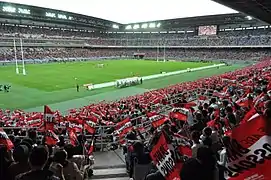 |
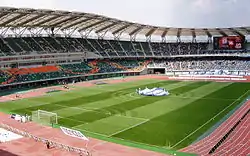 |
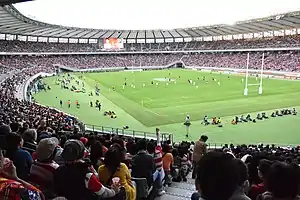 |
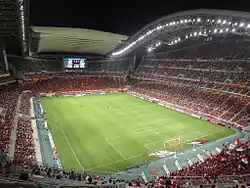 |
 |
| Ōita | Kobe | |||
| Oita Stadium | Kobe Misaki Stadium | |||
| Capacity: 40,000 | Capacity: 30,132 | |||
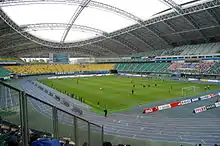 |
 | |||
| Higashiōsaka (Osaka) | Kumamoto | Kumagaya | Fukuoka | Kamaishi |
| Hanazono Rugby Stadium | Kumamoto Stadium | Kumagaya Rugby Stadium | Fukuoka Hakatanomori Stadium | Kamaishi Recovery Memorial Stadium |
| Capacity: 24,100 | Capacity: 32,000 | Capacity: 24,000 | Capacity: 20,049 | Capacity: 16,020 |
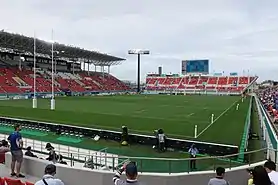 |
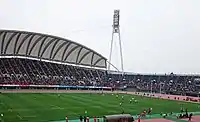 |
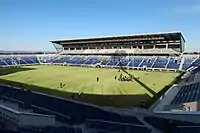 |
 |
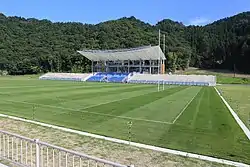 |
Qualifying
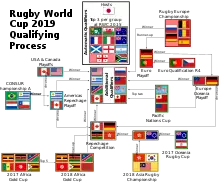

Did not enter or not a World Rugby full member
The top three teams from the pools at the 2015 World Cup received an automatic spot, with the remaining eight teams coming from the qualifying series around the world. Six of the remaining eight spots available were filled by regional qualifiers with the additional two spots being filled in play-off. Qualifying was split into five regional groups; Africa, Americas, Asia, Europe and Oceania.[10]
On 1 July 2017, the United States became the first team to qualify after defeating Canada in the two-leg match to qualify as America 1.[11] The following two weeks saw Fiji and Tonga booking their spots as Oceania 1 and 2 respectively.[12] Samoa later confirmed their spot as the third Oceanic team with a win over Germany in a two-legged tie the following year.[13] In January 2018, Uruguay became the fourth team to qualify with a 10-point victory over Canada across the two legs to book a spot as Americas 2.[14]
In March, Romania initially qualified to take the spot as Europe 1.[15] But after complaints from the Spanish into an investigation of ineligible players, it was deemed that Romania, Spain and Belgium all broke the eligibility rules and were deducted points which meant Russia qualified for the World Cup while Germany headed to the play-off against Samoa.[16] In August, Namibia became the final team to qualify from the continental tournaments after defeating Kenya in the final round of the Rugby Africa Gold Cup.[17] The final spot was decided by a repechage tournament in Marseille in November 2018, which was won by Canada after winning all three of their games.[18]
| Region | Team | Qualification method |
Previous Apps |
Previous best result | World Ranking1 |
|---|---|---|---|---|---|
| Africa | Top 3 in 2015 RWC pool | 6 | Champions (1995, 2007) | 4 | |
| Africa 1 | 5 | Pool stage | 23 | ||
| Americas North | Americas 1 | 7 | Pool stage | 13 | |
| Repechage | 8 | Quarter-finals (1991) | 22 | ||
| Asia | Hosts | 8 | Pool stage | 10 | |
| Europe | Top 3 in 2015 RWC pool | 8 | Champions (2003) | 3 | |
| Top 3 in 2015 RWC pool | 8 | Runners-up (1987, 1999, 2011) | 8 | ||
| Top 3 in 2015 RWC pool | 4 | Pool stage | 12 | ||
| Top 3 in 2015 RWC pool | 8 | Quarter-finals (six times) | 1 | ||
| Top 3 in 2015 RWC pool | 8 | Pool stage | 14 | ||
| Europe 1 | 1 | Pool stage | 20 | ||
| Top 3 in 2015 RWC pool | 8 | Fourth place (1991) | 7 | ||
| Top 3 in 2015 RWC pool | 8 | Third place (1987) | 5 | ||
| Oceania | Top 3 in 2015 RWC pool | 8 | Champions (1991, 1999) | 6 | |
| Oceania 1 | 7 | Quarter-finals (1987, 2007) | 9 | ||
| Top 3 in 2015 RWC pool | 8 | Champions (1987, 2011, 2015) | 2 | ||
| Play-off winner | 7 | Quarter-finals (1991, 1995) | 16 | ||
| Oceania 2 | 7 | Pool stage | 15 | ||
| Sudamérica | Top 3 in 2015 RWC pool | 8 | Third place (2007) | 11 | |
| Americas 2 | 3 | Pool stage | 19 |
Draw
The pool draw took place[19] on 10 May 2017, in Kyoto.[20] The draw was moved from its traditional place of December in the year following the previous World Cup, after the November internationals, so that nations had a longer period of time to increase their world rankings ahead of the draw.[21]
The seeding system from previous Rugby World Cups was retained with the 12 automatic qualifiers from 2015 being allocated to their respective bands based on their World Rugby Rankings on the day of the draw:
- Band 1: The four highest-ranked teams
- Band 2: The next four highest-ranked teams
- Band 3: The final four directly qualified teams
The remaining two bands were made up of the eight qualifying teams, with allocation to each band being based on the previous Rugby World Cup playing strength:
- Band 4: – Oceania 1, Americas 1, Europe 1, Africa 1
- Band 5: – Oceania 2, Americas 2, Play-off Winner, Repechage Winner
This meant the 20 teams, qualified and qualifiers, were seeded thus (world ranking as of 10 May 2017):
| Band 1 | Band 2 | Band 3 | Band 4 | Band 5 |
|---|---|---|---|---|
|
|
|
The draw saw a representative randomly draw a ball from a pot; the first drawn ball went to Pool A, the second Pool B, the third Pool C and the fourth Pool D.
Squads
Each team submitted a squad of 31 players for the tournament, the same as the 2015 tournament. These squads were to be submitted to World Rugby with the deadline being 8 September with the United States being the last team to reveal their squad on 6 September.[22][23]
Match officials
World Rugby named the following 12 referees, seven assistant referees and four television match officials to handle the 48 matches:[24]
|
|
Opening ceremony
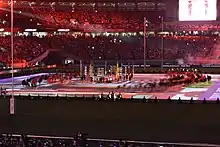
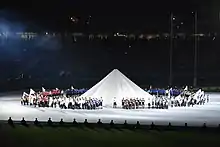
The opening ceremony took place at Ajinomoto Stadium in Tokyo on 20 September 2019 at 18:30 (JST).[25] The ceremony featured a showcase of traditional and modern Japanese culture, as well as the culture of rugby union, and told the story of the evolution of rugby union in Japan.[26] New Zealand's Richie McCaw, who captained the All Blacks to the World Cup title in 2015, performed a ceremonial handover of the Webb Ellis Cup.[27] Six jet aircraft of the Japan Air Self-Defense Force's Blue Impulse aerobatic team flew over the stadium.[28] Kiyoe Yoshioka of Japanese pop-rock band Ikimono-gakari sang World in Union, the official song of the Rugby World Cup.[29] The tournament was officially declared open by Fumihito, Prince Akishino of Japan; both he and World Rugby chairman Sir Bill Beaumont gave speeches at the end of the ceremony, with Beaumont saying:[30]
"Over the next six weeks we will experience the very best of rugby and the very best of Japan as excitement sweeps this great nation. I know Japan will be the most welcoming of hosts, you are the best. The waiting is over and the stage is set. It’s now over to the teams and the fans to make this the best World Cup ever."
Pool stage
The 20 teams are divided into four pools of five teams. Each pool is a single round-robin of 10 games, in which each team plays one match against each of the other teams in the same pool. Teams are awarded four league points for a win, two for a draw and none for a defeat. A team scoring four tries in a match is awarded a bonus point, as is a team that loses by seven points or fewer – both bonus points are awarded if both situations apply. The teams finishing in the top two of each pool advance to the quarter-finals.[31] The top three teams of each pool received automatic qualification to the 2023 Rugby World Cup.
- Tie-breaking criteria
If two or more teams are tied on match points, the following tiebreakers apply:
- The winner of the match between the two teams
- Difference between points scored for and points scored against in all pool matches
- Difference between tries scored for and tries scored against in all pool matches
- Points scored in all pool matches
- Most tries scored in all pool matches
- Official World Rugby Rankings as of 14 October 2019
If three teams were tied on points, the above criteria would be used to decide first place in the pool and then the criteria would be used again (starting from criterion 1) to decide second place in the pool.[31]
| Key to colours in pool tables | |
|---|---|
| Advanced to the quarter-finals and qualified for the 2023 Rugby World Cup | |
| Eliminated but qualified for 2023 Rugby World Cup | |
Pool A
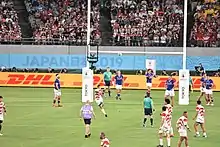
| Pos | Team | Pld | W | D | L | PF | PA | PD | T | B | Pts |
|---|---|---|---|---|---|---|---|---|---|---|---|
| 1 | 4 | 4 | 0 | 0 | 115 | 62 | +53 | 13 | 3 | 19 | |
| 2 | 4 | 3 | 0 | 1 | 121 | 27 | +94 | 18 | 4 | 16 | |
| 3 | 4 | 2 | 0 | 2 | 119 | 55 | +64 | 16 | 3 | 11 | |
| 4 | 4 | 1 | 0 | 3 | 58 | 128 | −70 | 8 | 1 | 5 | |
| 5 | 4 | 0 | 0 | 4 | 19 | 160 | −141 | 1 | 0 | 0 |
The opening match of the 2019 Rugby World Cup was played in Pool A with Japan scoring a 30–10 win over Russia. Kotaro Matsushima became the first Japanese player to score a hat-trick at a World Cup. For the Russian side, Kirill Golosnitsky scored the first try of the tournament after four minutes – the fastest try ever scored in the opening match of a World Cup.[32] Two days later, Ireland defeated Scotland 27–3.[33] On 24 September, Samoa played their first match against Russia in Kumagaya, and Samoa went on to win 34–9.[34] Four days later, hosts Japan defeated Ireland 19–12, scoring four out of six penalties. While it was an upset win for Japan, World Rugby later admitted three of the four offside penalties were incorrectly awarded to Japan.[35][36] Kenki Fukuoka scored a try in the 58th minute to give Japan a two-point lead after Ireland's Garry Ringrose and Rob Kearney had scored the opening two tries. Yu Tamura's conversion and fourth successful penalty kick sealed the result for Japan.[37] Scotland recorded their first victory of the World Cup with a 34–0 whitewash victory over Samoa in muggy conditions in Kobe, with Samoan captain Jack Lam stating that the rugby ball was "a bar of soap."[38]
Three days later, Kobe Misaki Stadium held another match in Pool A – this time it was Ireland, who whitewashed their opponents (Russia) in a 35–0 victory with five different players getting tries for the Irish. The Irish though, did not have everything go right with Jordi Murphy being subbed off in the 27th minute due to a possible rib injury, which added to the Irish back row pain after losing Jack Conan earlier in the tournament.[39] Japan recorded their third victory over Samoa in Toyota with a 85th minute try from Kotaro Matsushima sealing the Japanese a 38–19 bonus point victory.[40] Russia in the final match of the tournament was hammered by Scotland 61–0 with George Horne scoring a hat-trick as the Scots became the first team in World Cup history to not concede a point from two consecutive World Cup matches.[41] A red card to Bundee Aki in the 29th minute forced Ireland to go down to 14 men but that was the only blemish with Ireland winning 47–5 over Samoa in Fukuoka. Johnny Sexton scoring two tries for the Irish.[42] The typhoon saw the Japan–Scotland match under threat with the Scottish Rugby Union demanding legal action if it was cancelled.[43] But after an inspection deemed the match to go ahead,[44] Japan held their nerve against a fast-finishing Scotland to take home a 28–21 victory with Kenki Fukuoka scoring two tries. The win saw Japan become the first Tier 2 team to qualify since 2007, as they topped the group while Ireland finished in second place.[45]
| 20 September 2019 | Japan | 30–10 | Tokyo Stadium, Chōfu | |
| 22 September 2019 | Ireland | 27–3 | International Stadium Yokohama, Yokohama | |
| 24 September 2019 | Russia | 9–34 | Kumagaya Rugby Stadium, Kumagaya | |
| 28 September 2019 | Japan | 19–12 | Shizuoka Stadium Ecopa, Fukuroi | |
| 30 September 2019 | Scotland | 34–0 | Kobe Misaki Stadium, Kobe | |
| 3 October 2019 | Ireland | 35–0 | Kobe Misaki Stadium, Kobe | |
| 5 October 2019 | Japan | 38–19 | City of Toyota Stadium, Toyota | |
| 9 October 2019 | Scotland | 61–0 | Shizuoka Stadium Ecopa, Fukuroi | |
| 12 October 2019 | Ireland | 47–5 | Fukuoka Hakatanomori Stadium, Fukuoka | |
| 13 October 2019 | Japan | 28–21 | International Stadium Yokohama, Yokohama |
Pool B
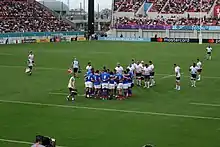
| Pos | Team | Pld | W | D | L | PF | PA | PD | T | B | Pts |
|---|---|---|---|---|---|---|---|---|---|---|---|
| 1 | 4 | 3 | 1 | 0 | 157 | 22 | +135 | 22 | 2 | 16 | |
| 2 | 4 | 3 | 0 | 1 | 185 | 36 | +149 | 27 | 3 | 15 | |
| 3 | 4 | 2 | 1 | 1 | 98 | 78 | +20 | 14 | 2 | 12 | |
| 4 | 4 | 0 | 1 | 3 | 34 | 175 | −141 | 3 | 0 | 2 | |
| 5 | 4 | 0 | 1 | 3 | 14 | 177 | −163 | 2 | 0 | 2 |
Pool B started with New Zealand beating South Africa 23–13. New Zealand opened their scoring with two tries in four minutes from George Bridge and Scott Barrett giving New Zealand a 17–3 lead at half-time. Pieter-Steph du Toit scored a converted try to bring the score back to 17–10 but two penalties from Richie Mo'unga and Beauden Barrett sealed the result.[46] In Higashiōsaka, Italy conceded an early try against Namibia before running away with a bonus-point victory by 25 points.[47] Italy earned a second bonus-point victory in Fukuoka, scoring seven tries in a 48–7 demolition of Canada.[48] Over in Toyota, South Africa defeated Namibia by 54 points, scoring nine tries while Namibia could manage only a Cliven Loubser penalty in the 23rd minute.[49] New Zealand recorded their second victory of the World Cup with a 63–0 victory over Canada at Ōita Stadium. For New Zealand, Brad Weber scored his first two tries in international rugby with the Barrett brothers (Jordie Barrett, Beauden Barrett and Scott Barrett) each scoring a try as they became the first trio of brothers to start for New Zealand.[50]
New Zealand continued their demolition of their opponents with a 62-point win over Namibia in Chōfu, with the floodgates opening in the second half after Namibia restricted the All Blacks to 24 points in the first half. Sevu Reece, Ben Smith and Anton Lienert-Brown scoring two tries in the match.[51] Between the two New Zealand games, South Africa romped over Italy with Cheslin Kolbe scoring two tries as the South Africans won 49–3 in Fukuroi.[52] This was followed by a 66–7 victory over Canada with Cobus Reinach scoring the fastest hat-trick in World Cup history, with his three tries being scored in a space of 11 minutes.[53] The final two matches of the group were not played as Typhoon Hagibis saw the cancellation of the New Zealand–Italy and Namibia–Canada matches.[54][55] At the end of the pool stage, New Zealand finished on top of the table with South Africa finishing second.[56]
| 21 September 2019 | New Zealand | 23–13 | International Stadium Yokohama, Yokohama | |
| 22 September 2019 | Italy | 47–22 | Hanazono Rugby Stadium, Higashiōsaka | |
| 26 September 2019 | Italy | 48–7 | Fukuoka Hakatanomori Stadium, Fukuoka | |
| 28 September 2019 | South Africa | 57–3 | City of Toyota Stadium, Toyota | |
| 2 October 2019 | New Zealand | 63–0 | Ōita Stadium, Ōita | |
| 4 October 2019 | South Africa | 49–3 | Shizuoka Stadium Ecopa, Fukuroi | |
| 6 October 2019 | New Zealand | 71–9 | Tokyo Stadium, Chōfu | |
| 8 October 2019 | South Africa | 66–7 | Kobe Misaki Stadium, Kobe | |
| 12 October 2019 | New Zealand | 0–01 | City of Toyota Stadium, Toyota | |
| 13 October 2019 | Namibia | 0–02 | Kamaishi Recovery Memorial Stadium, Kamaishi |
Pool C
| Pos | Team | Pld | W | D | L | PF | PA | PD | T | B | Pts |
|---|---|---|---|---|---|---|---|---|---|---|---|
| 1 | 4 | 3 | 1 | 0 | 119 | 20 | +99 | 17 | 3 | 17 | |
| 2 | 4 | 3 | 1 | 0 | 79 | 51 | +28 | 9 | 1 | 15 | |
| 3 | 4 | 2 | 0 | 2 | 106 | 91 | +15 | 14 | 3 | 11 | |
| 4 | 4 | 1 | 0 | 3 | 67 | 105 | −38 | 9 | 2 | 6 | |
| 5 | 4 | 0 | 0 | 4 | 52 | 156 | −104 | 7 | 0 | 0 |
Pool C's opening match saw Argentina come back from a 17-point half-time deficit against France at Tokyo Stadium, only for France's Camille Lopez to score a game-winning drop goal in the 70th minute to win 23–21.[57] In Sapporo, two tries from Manu Tuilagi helped England to a bonus-point victory over Tonga.[58] England followed that up with a 38-point victory over the United States, with Joe Cokanasiga scoring two tries in the victory; however, the match was soured by the first red card of the tournament, shown to the United States' John Quill for a shoulder charge to the head of England's Owen Farrell.[59] Argentina bounced back from their defeat by France with a 28–12 victory over Tonga in Higashiōsaka; all of Argentina's scoring happened in the first 28 minutes, including a hat-trick from Julián Montoya as they raced to a 28-point lead before Tonga brought the margin back to 16 with two tries of their own.[60] After Typhoon Mitag almost cancelled the match,[61] the French were inconsistent with errors keeping the United States in the match before three late tries in the second half secured a 33–9 win in Fukuoka.[62]
In Chōfu, England qualified for the quarter-finals with a 39–10 victory over Argentina with Argentinean player Tomás Lavanini being shown a red card, which forced Argentina down to 14 men as he was forced off due to a high tackle on Owen Farrell's head.[63] France later joined them in qualifying for the knockout stage with a two-point victory over Tonga at Kumamoto Stadium. After conceding the first 17 points of the match, Tonga came back into the match with tries from Sonatane Takulua and Mali Hingano to close the gap to only three points before Romain Ntamack gave the cushion that France needed with two penalties in eight minutes giving France the victory.[64] Argentina became the first team to finish their matches of the 2019 World Cup, with a 47–17 victory over the United States in Kumagaya. Joaquín Tuculet and Juan Cruz Mallia each scored two tries in the meeting, their first since 2003.[65] After the England–France game was cancelled due to Typhoon Hagibis,[54] Tonga ended their World Cup campaign with a 31–19 victory over the United States. This was due to the Tongan's using their opportunities with them converting into tries and despite the United States being within striking range with three minutes to go, Telusa Veainu converted the match-winning try and a bonus-point victory for Tonga.[66] At the end of the pool stage, it was England winning the group with France finishing in second place.[56]
| 21 September 2019 | France | 23–21 | Tokyo Stadium, Chōfu | |
| 22 September 2019 | England | 35–3 | Sapporo Dome, Sapporo | |
| 26 September 2019 | England | 45–7 | Kobe Misaki Stadium, Kobe | |
| 28 September 2019 | Argentina | 28–12 | Hanazono Rugby Stadium, Higashiōsaka | |
| 2 October 2019 | France | 33–9 | Fukuoka Hakatanomori Stadium, Fukuoka | |
| 5 October 2019 | England | 39–10 | Tokyo Stadium, Chōfu | |
| 6 October 2019 | France | 23–21 | Kumamoto Stadium, Kumamoto | |
| 9 October 2019 | Argentina | 47–17 | Kumagaya Rugby Stadium, Kumagaya | |
| 12 October 2019 | England | 0–01 | International Stadium Yokohama, Yokohama | |
| 13 October 2019 | United States | 19–31 | Hanazono Rugby Stadium, Higashiōsaka |
Pool D
| Pos | Team | Pld | W | D | L | PF | PA | PD | T | B | Pts |
|---|---|---|---|---|---|---|---|---|---|---|---|
| 1 | 4 | 4 | 0 | 0 | 136 | 69 | +67 | 17 | 3 | 19 | |
| 2 | 4 | 3 | 0 | 1 | 136 | 68 | +68 | 20 | 4 | 16 | |
| 3 | 4 | 1 | 0 | 3 | 110 | 108 | +2 | 17 | 3 | 7 | |
| 4 | 4 | 1 | 0 | 3 | 65 | 122 | −57 | 9 | 1 | 5 | |
| 5 | 4 | 1 | 0 | 3 | 60 | 140 | −80 | 6 | 0 | 4 |
Pool D opened with Australia beating Fiji by 18 points in Sapporo after Fiji led by two points at half-time. Australia scored four tries in the second half for the bonus point.[67] Wales beat Georgia 43–14 at City of Toyota Stadium, after leading 29–0 at half-time and 22–0 after three tries in the first 19 minutes.[68] In Kamaishi, Fiji scored the opening try against Uruguay. Two mistakes within eight minutes gave Teros the lead before a try from Juan Manuel Cat enhanced it to 12 points at half-time. Three Fijian tries in the second half were to no avail as two penalty goals from Felipe Berchesi gave Uruguay their first win in a World Cup since 2003.[69] In Kumagaya on 29 September, Georgia recorded a 33–7 win over Uruguay. Dominant work by their forwards in the second half laid the foundation for the bonus-point victory.[70] Over in Chōfu, Dan Biggar scored the fastest drop goal in World Cup history as Wales led 23–8 at the half. Two second-half tries from Australia brought the scores to within a point but the Welsh held out for a 29–25 win.[71]
A second half performance from Fiji at a wet Hanazono Rugby Stadium saw the Fijians record their first win of their 2019 World Cup campaign as they won 45–10 over Georgia. This was partly due to Semi Radradra scoring two tries while also aiding in setting up three more tries as Fiji scored seven tries to one in the bonus-point victory.[72] Another slow start for the Australians in their game with Uruguay did not stop them from recording a win over the South Americans, with Tevita Kuridrani and Dane Haylett-Petty each getting two tries in the 35-point victory at Ōita Stadium.[73] Four days later at the same stadium, Fiji got off to a 10–0 lead with the tries coming from Josua Tuisova and Kini Murimurivalu within eight minutes. Fiji held their lead until the 31st minute when Josh Adams scored his second try of three for the match. Wales increased their lead from there to win 29–17, qualifying for the quarter-finals with Australia.[74] The penultimate match of Pool D saw Australia outlast a tough Georgia in difficult conditions in Fukuroi, as they won 27–8.[75] Wales finished undefeated with a 35–13 win over Uruguay at Kumamoto Stadium to record a bonus-point victory and set up a quarter-final with France while Australia came in second.[76]
| 21 September 2019 | Australia | 39–21 | Sapporo Dome, Sapporo | |
| 23 September 2019 | Wales | 43–14 | City of Toyota Stadium, Toyota | |
| 25 September 2019 | Fiji | 27–30 | Kamaishi Recovery Memorial Stadium, Kamaishi | |
| 29 September 2019 | Georgia | 33–7 | Kumagaya Rugby Stadium, Kumagaya | |
| 29 September 2019 | Australia | 25–29 | Tokyo Stadium, Chōfu | |
| 3 October 2019 | Georgia | 10–45 | Hanazono Rugby Stadium, Higashiōsaka | |
| 5 October 2019 | Australia | 45–10 | Ōita Stadium, Ōita | |
| 9 October 2019 | Wales | 29–17 | Ōita Stadium, Ōita | |
| 11 October 2019 | Australia | 27–8 | Shizuoka Stadium Ecopa, Fukuroi | |
| 13 October 2019 | Wales | 35–13 | Kumamoto Stadium, Kumamoto |
Knockout stage
The knockout stage of the Rugby World Cup consisted of three single-elimination rounds leading to a final and a third-place playoff. Following a tie in regulation time, two 10-minute periods of extra time would be used to determine a winner. If the scores are tied at the end of extra time, an additional 10-minute "sudden death" period is played, with the first team to score any points being declared the winner. If the score remains tied at the end of extra time, a kicking competition would ensue.[31]
| Quarter-finals | Semi-finals | Final | ||||||||
| 19 October – Ōita | ||||||||||
| 40 | ||||||||||
| 26 October – Yokohama | ||||||||||
| 16 | ||||||||||
| 19 | ||||||||||
| 19 October – Chōfu | ||||||||||
| 7 | ||||||||||
| 46 | ||||||||||
| 2 November – Yokohama | ||||||||||
| 14 | ||||||||||
| 12 | ||||||||||
| 20 October – Ōita | ||||||||||
| 32 | ||||||||||
| 20 | ||||||||||
| 27 October – Yokohama | ||||||||||
| 19 | ||||||||||
| 16 | ||||||||||
| 20 October – Chōfu | ||||||||||
| 19 | Third place | |||||||||
| 3 | ||||||||||
| 1 November – Chōfu | ||||||||||
| 26 | ||||||||||
| 40 | ||||||||||
| 17 | ||||||||||
Quarter-finals
The first two quarter-finals were played on Saturday. The first quarter-final saw England defeat Australia 40–16 at Ōita Stadium. Two tries from Jonny May, plus the 18 turnovers that the Australians conceded and led to two more being scored by England, sealed the result that prompted Michael Cheika to resign as Australian coach.[77][78] The following match saw New Zealand book their spot in the semi-finals, with the All Blacks cruising to a 46–14 win over Ireland at Tokyo Stadium. Aaron Smith scored two of the All Blacks' seven tries, with the Irish only getting on the board in the 69th minute from a Robbie Henshaw converted try. A penalty try was then added seven minutes later.[79]
The other two quarter-finals were played the following day. In the opening match, France got off to an early 12–0 lead with Sébastien Vahaamahina and Charles Ollivon both scoring tries in the first eight minutes. Aaron Wainwright opened the Welsh account with a try in the 12th minute before Virimi Vakatawa scored the French's third, giving them a 19–10 lead at the break. Nine minutes into the second half, France went down to 14 men with Sébastien Vahaamahina being red-carded for an elbow to Aaron Wainwright as Wales went on to win the match 20–19 with a 74th minute try to Ross Moriarty.[80] In the last quarter-final match, it was South Africa who claimed a 26–3 win over Japan with Makazole Mapimpi scoring two tries in the victory.[81]
| 19 October 2019 16:15 JST (UTC+09) |
| England | 40–16 | |
| Try: May (2) 18' c, 21' c Sinckler 46' c Watson 76' c Con: Farrell (4/4) 19', 23', 47', 77' Pen: Farrell (4/4) 30', 51', 66', 73' | Report | Try: Koroibete 43' c Con: Lealiifano (1/1) 44' Pen: Lealiifano (3/3) 12', 26', 41' |
| Ōita Stadium, Ōita Attendance: 36,954 Referee: Jérôme Garcès (France) |
| 19 October 2019 19:15 JST (UTC+09) |
| New Zealand | 46–14 | |
| Try: A. Smith (2) 14' c, 20' c B. Barrett 32' m Taylor 48' c Todd 61' m Bridge 73' c J. Barrett 79' m Con: Mo'unga (4/7) 15', 22', 49' 74' Pen: Mo'unga (1/1) 6' | Report | Try: Henshaw 69' c Penalty try 76' Con: Carbery (1/1) 69' |
| Tokyo Stadium, Chōfu Attendance: 46,686 Referee: Nigel Owens (Wales) |
| 20 October 2019 16:15 JST (UTC+09) |
| Wales | 20–19 | |
| Try: Wainwright 12' c Moriarty 74' c Con: Biggar (2/2) 13', 75' Pen: Biggar (2/2) 20', 54' | Report | Try: Vahaamahina 5' m Ollivon 8' c Vakatawa 31' c Con: Ntamack (2/3) 9', 32' |
| Ōita Stadium, Ōita Attendance: 34,426 Referee: Jaco Peyper (South Africa) |
| 20 October 2019 19:15 JST (UTC+09) |
| Japan | 3–26 | |
| Pen: Tamura (1/1) 20' | Report | Try: Mapimpi (2) 4' m, 70' m de Klerk 66' c Con: Pollard (1/3) 66' Pen: Pollard (3/4) 44', 49', 64' |
| Tokyo Stadium, Chōfu Attendance: 48,831 Referee: Wayne Barnes (England) |
Semi-finals
In the first semi-final, England took on New Zealand in front of 68,843 spectators in Yokohama. In response to New Zealand's haka, England's players stood in a V-shape formation, for which they were later fined having crossed the halfway line.[82] England scored the opening points of the game in the second minute with a try from Manu Tuilagi, converted by Owen Farrell. After two penalties on either side of the half, the All Blacks responded in the 57th minute to close the gap to six points with a converted try from Ardie Savea, but two later penalties in the 63rd and the 69th confirmed England's spot in the final.[83]
The second semi-final was also played in Yokohama, as the 67,750 spectators in attendance saw South Africa take on Wales for a spot against England in the final. South Africa took a 9–6 lead into half-time, but Biggar levelled the scores with a penalty kick six minutes into the second half. Damian de Allende then scored the first try of the match in the 57th minute, fending off two Welsh tacklers to score from 20 metres out. Wales again equalised thanks to Josh Adams scoring down the short side from an attacking scrum on the South African five-metre line; however, they were penalised for collapsing a maul with five minutes left in the game, allowing Pollard to kick the winning points and book South Africa a spot in the final.[84]
| 26 October 2019 17:00 JST (UTC+09) |
| England | 19–7 | |
| Try: Tuilagi 2' c Con: Farrell (1/1) 3' Pen: Ford (4/5) 40', 50', 63', 69' | Report | Try: Savea 57' c Con: Mo'unga (1/1) 58' |
| International Stadium Yokohama, Yokohama Attendance: 68,843 Referee: Nigel Owens (Wales) |
| 27 October 2019 18:00 JST (UTC+09) |
| Wales | 16–19 | |
| Try: Adams 65' c Con: Halfpenny (1/1) 66' Pen: Biggar (3/3) 18', 39', 46' | Report | Try: de Allende 57' c Con: Pollard (1/1) 58' Pen: Pollard (4/4) 15', 20', 35', 76' |
| International Stadium Yokohama, Yokohama Attendance: 67,750 Referee: Jérôme Garcès (France) |
Bronze final
The bronze medal was won by New Zealand in a convincing win over Wales.[85]
| 1 November 2019 18:00 JST (UTC+09) |
| New Zealand | 40–17 | |
| Try: Moody 5' c B. Barrett 13' c B. Smith (2) 33' c, 40+1' c Crotty 42' c Mo'unga 76' m Con: Mo'unga (5/6) 7', 14', 34', 40+2', 44' | Report | Try: Amos 19' c Adams 59' c Con: Patchell (1/1) 21' Biggar (1/1) 61' Pen: Patchell (1/1) 27' |
| Tokyo Stadium, Chōfu Attendance: 48,842 Referee: Wayne Barnes (England) |
Final
England started as favourites for the final,[86] but they had an unfortunate start to the game as Kyle Sinckler was substituted in the third minute after colliding with Maro Itoje,[87] leaving England with only one tighthead prop.[88] South Africa tight forwards Bongi Mbonambi and Lood de Jager left the field through injuries in the 21st minute.[89] During the first half the only points scored were from penalties, with South Africa leading 12–6 at half time after several handling errors by England.[90] England came close to scoring a try, but did not manage to score after 26 phases.[88]
Two more successful penalties on either side made the score 18–12 at the beginning of the second half. Makazole Mapimpi scored the first try in the 66th minute, making South Africa's lead 25–12 after the conversion while becoming the first Springbok to score a try in a World Cup final.[88] Cheslin Kolbe followed up with another try eight minutes later, making the final score 32–12.[88][90][91]
| 2 November 2019 18:00 JST (UTC+09) |
| England | 12–32 | |
| Pen: Farrell (4/5) 23', 35', 52', 60' | Report | Try: Mapimpi 66' c Kolbe 74' c Con: Pollard (2/2) 67', 75' Pen: Pollard (6/8) 10', 26', 39', 43', 46', 58' |
| International Stadium Yokohama, Yokohama Attendance: 70,103 Referee: Jérôme Garcès (France) |
Statistics
Most tries
- 7 tries
- 6 tries
- 5 tries
- 4 tries
Most points
| Player | Team | Total | Details | |||
|---|---|---|---|---|---|---|
| Tries | Conversions | Penalties | Drop goals | |||
| Handré Pollard | 69 | 0 | 9 | 16 | 1 | |
| Owen Farrell | 58 | 0 | 11 | 12 | 0 | |
| Richie Mo'unga | 54 | 1 | 20 | 3 | 0 | |
| Yu Tamura | 51 | 0 | 9 | 11 | 0 | |
| Dan Biggar | 41 | 0 | 10 | 6 | 1 | |
| Josh Adams | 35 | 7 | 0 | 0 | 0 | |
| George Ford | 32 | 2 | 5 | 4 | 0 | |
| Jordie Barrett | 31 | 3 | 8 | 0 | 0 | |
| Makazole Mapimpi | 30 | 6 | 0 | 0 | 0 | |
| Felipe Berchesi | 30 | 0 | 6 | 6 | 0 | |
Typhoon Hagibis and match cancellations
On 10 October, World Rugby and the Japan Rugby 2019 Organising Committee announced that, due to the predicted weather caused by Typhoon Hagibis, the Pool B meeting between New Zealand and Italy and the Pool C meeting between England and France had been cancelled.[92] The decisions had been made on safety grounds with considerations on the expected impact the typhoon would have on Tokyo, including likely public transport shutdown or disruption. This was the first ever occasion any Rugby World Cup match had been cancelled.[93] Decision on cancellation of pool games scheduled for 13 October was made on the day of the game, including the match between Japan and Scotland.[54]
On the evening of 12 October Japan Standard Time (JST), World Rugby and the Japan 2019 Organising Committee released a statement that they had advised Namibia and Canada of the possibility of their game being cancelled, with the typhoon predicted to impact Kamaishi.[94] On 13 October, World Rugby and the Japan 2019 Organising Committee announced the cancellation of the Namibia–Canada game in Kamaishi.[95] The decision was made following a level 5 evacuation order in the city on the day of the match following the typhoon.[96] Canada's national team stayed in Kamaishi to help out local residents with their cleanup efforts.[97] The Namibia national team interacted with fans in the campsite Miyako City.[98][99]
Shortly after the announcement of the cancellation of the Namibia–Canada game, it was confirmed that the matches between Wales and Uruguay and the United States and Tonga would go ahead as scheduled.[55] By noon on 12 October, it was confirmed that the match between Japan and Scotland was unaffected by the typhoon and would take place as scheduled, in front of spectators who had previously feared that they might have missed out with the game played behind closed doors.[100]
In line with tournament rules, the canceled pool matches were declared as drawn, the points being shared two each with no score registered.[31] With these cancellations, France were unable to compete for the top pool position (held by England at the time), with a victory to secure that place. For Italy, however, the cancellation effectively eliminated them from the tournament; a victory against defending champions New Zealand could have seen them qualify for the knock-out stage, dependent on the margin of the win.[101] This also had implications on whether South Africa finished top of their pool or as runners-up, having already confirmed their progression to the quarter-finals.[102][103]
Broadcasting
For the first time, the domestic rights holder did not serve as the host broadcaster of the tournament. Instead, International Games Broadcast Services (IGBS), a joint venture between Host Broadcast Services (HBS) and IMG, handled production of the footage distributed to rights holders. IGBS used production resources from traditional rugby nations such as Australia, France, New Zealand, South Africa and the United Kingdom. Japanese broadcaster NHK covered selected games in 8K resolution, using a combination of nine 8K cameras and up-converted 4K resolution footage from IGBS. The International Broadcast Centre was located outside Ajinomoto Stadium.[104][105]
World Rugby streamed the tournament on its website for unsold markets.[106] Sport24 was the rights holder for in-flight/in-ship broadcast.[107] In South Africa, pay television channel SuperSport had broadcasting rights. To enable the whole country to watch, the free-to-air South African Broadcasting Corporation (SABC) broadcast the final after they reached an agreement with MultiChoice.[108]
| Territory | Rights holder | Ref. |
|---|---|---|
| Albania | DigitAlb | [105] |
| Argentina | TPA | [109] |
| Australia | [110][111] | |
| Belgium | Telenet | [105] |
| Brazil | ESPN | [112] |
| Canada | TSN | [113] |
| Cyprus | CYTA | [105] |
| Czech Republic | Pragosport | [105] |
| Fiji | Fiji TV | [114] |
| France | TF1 Group | [115] |
| Georgia | GPB | [105] |
| Germany | ProSiebenSat.1 Media | [116] |
| Hong Kong | beIN Sports | [117] |
| India | Sony Pictures Networks | [118] |
| Ireland | [119][120] | |
| Israel | Charlton | [105] |
| Italy | RAI | [121] |
| Japan | [105][122] | |
| Kosovo | DigitAlb | [105] |
| Latin America | ESPN | [112] |
| Latvia | LTV7 | [123] |
| Malaysia | RTM | [105] |
| MENA | beIN Sports | [124] |
| Netherlands | Ziggo Sport | [125] |
| New Zealand | [126][127] | |
| Nordic | NENT | [128] |
| Pacific Islands | Fiji TV | [114] |
| Poland | Polsat | [105] |
| Portugal | Sport TV | [105] |
| Russia | Match TV | [105] |
| Romania | TVR | [129] |
| Slovakia | Pragosport | [105] |
| Southeast Asia | beIN Sports | [117] |
| Spain | Movistar+ | [130] |
| Sub-Saharan Africa | SuperSport | [105] |
| Taiwan | ELTA | [131] |
| United Kingdom | [132][133] | |
| United States | NBCUniversal | [134] |
| Uruguay | Channel 10 | [135] |
Notes
^1 Typhoon Hagibis caused the matches New Zealand versus Italy and England versus France to be cancelled and recorded as 0–0 draws.[54]
^2 Typhoon Hagibis and an associated evacuation order for Kamaishi caused the match between Namibia and Canada to be cancelled and recorded as a 0–0 draw.[55]
References
- "IRB confirm 2015 & 2019 host bids". BBC Sport. 15 August 2008. Retrieved 1 October 2019.
- "Russia keen to bid for RWC Sevens 2013". Rugby World Cup Sevens. World Rugby. 13 February 2009. Archived from the original on 27 May 2011. Retrieved 15 February 2009.
- "Russia to host Rugby World Cup Sevens 2013". Rugby World Cup Sevens (Press release). World Rugby. 12 May 2010. Archived from the original on 15 October 2013. Retrieved 1 January 2012.
- "Australia withdraws 2019 Cup bid". BBC Sport. 6 May 2009. Archived from the original on 9 May 2009. Retrieved 6 May 2009.
- "IRB confirms record RWC bid response". International Rugby Board. 8 May 2009. Archived from the original on 11 May 2009. Retrieved 9 May 2009.
- "England will host 2015 World Cup". BBC Sport. 28 July 2009. Retrieved 10 October 2019.
- "England will host 2015 World Cup". BBC Sport. 28 July 2009. Retrieved 28 July 2009.
- "New design for Tokyo Olympic stadium". BBC News. 22 December 2015. Retrieved 16 October 2019.
- "World Rugby approves revised Japan 2019 hosting roadmap" (Press release). World Rugby. 28 September 2015. Retrieved 28 September 2015.
- "RWC 2019 Qualifying". World Rugby. 12 February 2016. Archived from the original on 24 April 2018. Retrieved 30 September 2019.
- "USA book place at RWC 2019 in style". World Rugby. 2 July 2017. Retrieved 30 September 2019.
- "Tonga qualify for RWC 2019 as Oceania 2". World Rugby. 15 July 2019. Archived from the original on 15 July 2017. Retrieved 30 September 2019.
- "Samoa beat Germany to qualify for the 2019 Rugby World Cup". Associated Press. 15 July 2018. Retrieved 30 September 2019.
- "Uruguay qualify for RWC 2019". Rugby World Cup. 3 February 2018. Retrieved 1 October 2019.
- "Romania qualify for Rugby World Cup 2019". Rugby World Cup. 18 March 2018. Retrieved 1 October 2019.
- Jones, Chris (15 May 2018). "Rugby World Cup 2019: Russia qualify after Spain, Belgium and Romania sanctioned". BBC Sport. Retrieved 1 October 2019.
- "Namibia qualify for 2019 Rugby World Cup". Windhoek: The Namibian. 18 August 2019. Retrieved 1 October 2019.
- "Canada beats Hong Kong to qualify for 2019 Rugby World Cup". Canadian Broadcasting Corporation. 24 November 2018. Retrieved 14 October 2019.
- "Ireland land favourable Rugby World Cup draw". RTE Sport. 10 May 2017. Retrieved 10 May 2017.
- "Date confirmed Rugby World Cup 2019 pool draw". Rugby World Cup. World Rugby. 24 November 2016. Retrieved 1 May 2017.
- Glendinning, Barry (10 May 2017). "Rugby World Cup 2019 draw: England land France and Argentina – as it happened". The Guardian. Guardian News and Media. Retrieved 11 May 2017.
- de Menezes, Jack (19 September 2019). "Rugby World Cup 2019 squads: Every player from every team announced for Japan". The Independent. Archived from the original on 21 September 2019. Retrieved 11 October 2019.
- "Eagles opt for versatility in Rugby World Cup selection". World Rugby. 9 September 2019. Retrieved 11 October 2019.
- "Match officials selected for RWC 2019: Introducing Team 21". World Rugby. Retrieved 7 May 2019.
- "Stage set for spectacular Rugby World Cup 2019 opening ceremony | Rugby World Cup".
- "What time is Rugby World Cup opening ceremony on Friday?". 19 September 2019.
- "RWC opening ceremony stuns fans around the world".
- McKendry, Patrick (21 September 2019). "Fitting beginning to 2019 Rugby World Cup as Japan overcome Russia". The New Zealand Herald. Retrieved 21 September 2019.
- "Yoshioka Kiyoe to sing official song for 'Rugby World Cup'". Tokyo Hive. 27 September 2018. Retrieved 25 October 2018.
- "Rugby World Cup opening ceremony: Videos and best pictures".
- "Tournament rules". Rugby World Cup. World Rugby. Archived from the original on 28 September 2015. Retrieved 1 October 2019.
- Pugmire, Jerome (20 September 2019). "Japan beats Russia 30–10 in Rugby World Cup opener". Tokyo: Japan Today. Retrieved 23 September 2019.
- Duggan, Keith (22 September 2019). "Rugby World Cup: Ireland take a bow after near perfect opening night". Yokohama: The Irish Times. Retrieved 23 September 2019.
- "Samoa ease past battling Russia in bruising Rugby World Cup encounter". The Guardian. 24 September 2019. Retrieved 30 September 2019.
- Kinsella, Murray (1 October 2019). "Ireland get World Rugby feedback that three offside penalties were incorrect". The42.ie. Archived from the original on 3 October 2019. Retrieved 16 March 2021.
- "Rugby World Cup: World Rugby admitted penalty errors in Japan game, says Schmidt". BBC Sports. 1 October 2019.
- Freeman, Rich (28 September 2019). "Japan stun world No. 2 Ireland with 19–12 victory at Rugby World Cup". Japan Today. Retrieved 30 September 2019.
- Bull, Andy (30 September 2019). "Scotland shower points over Samoa in Rugby World Cup walkover". The Guardian. Kobe Misaki Stadium. Retrieved 8 October 2019.
- Thornley, Gerry (3 October 2019). "Rugby World Cup: Ireland make heavy weather of Russia win". Kobe Misaki Stadium: The Irish Times. Retrieved 8 October 2019.
- "Japan's late bonus from Matsushima against Samoa hurts Scotland". The Guardian. 5 October 2019. Retrieved 14 October 2019.
- Bull, Andy (9 October 2019). "Scotland run in nine tries to hammer Russia and keep World Cup hopes alive". The Guardian. Shizuoka Stadium Ecopa. Retrieved 14 October 2019.
- Thornley, Gerry (12 October 2019). "Improved Ireland qualify for Rugby World Cup quarter-finals". The Irish Times. Retrieved 14 October 2019.
- Harris, Talek (12 October 2019). "World Rugby slams Scotland legal threat over typhoon-hit game". Tokyo: Japan Today. Retrieved 14 October 2019.
- Kitson, Robert (13 October 2019). "Rugby World Cup: Scotland v Japan to go ahead but Namibia v Canada off". The Guardian. ISSN 0261-3077. Retrieved 13 October 2019.
- Phillips, Mitch (13 October 2019). "Japan beats Scotland 28-21 to advance to Rugby World Cup quarterfinals for first time". Japan Today. Retrieved 14 October 2019.
- Kitson, Robert (21 September 2019). "New Zealand stand firm against South Africa in heavyweight thriller". The Guardian. International Stadium Yokohama. Retrieved 25 September 2019.
- "Italy 47-22 Namibia: Azzurri open World Cup campaign with victory". BBC Sport. 22 September 2019. Retrieved 10 November 2019.
- "Matteo Minozzi seals Italy's seven-try romp over Canada at Rugby World Cup". The Guardian. 26 September 2019. Retrieved 1 October 2019.
- "South Africa coast home with nine-try thrashing of Namibia in World Cup". The Guardian. 28 September 2019. Retrieved 1 October 2019.
- Gallan, Daniel (3 October 2019). "All Blacks cruise to victory in nine-try rout of Canada". CNN. Retrieved 10 October 2019.
- Kitson, Robert (6 October 2019). "All Blacks fall behind before brushing aside brave Namibia at Rugby World Cup". The Guardian. Tokyo Stadium. Retrieved 10 October 2019.
- Cary, Tom (4 October 2019). "Cheslin Kolbe shines as South Africa thrash 14-man Italy to reach cusp of quarter-finals". The Telegraph. Shizuoka: The Daily Telegraph. Archived from the original on 12 January 2022. Retrieved 10 October 2019.
- Benson, Max (8 October 2019). "RWC 2019 results and highlights: South Africa 66-7 Canada – as it happened". The South African. Retrieved 10 October 2019.
- Jones, Chris (10 October 2019). "Rugby World Cup: Typhoon Hagibis forces England-France off; Scotland wait & Ireland play". BBC. Retrieved 11 October 2019.
- Mulvenney, Nick (13 October 2019). "Signs good Scotland match will go ahead after another cancellation". The Sydney Morning Herald. Retrieved 14 October 2019.
- McCurry, Justin (10 October 2019). "Rugby World Cup: England v France off and Japan v Scotland under threat from Typhoon Hagibis". The Guardian. Tokyo. Retrieved 14 October 2019.
- "Rugby: Lopez's dropped goal saves France in 23–21 win vs. Argentina". Tokyo: The Mainichi. 21 September 2019. Retrieved 26 September 2019.
- Kitson, Robert (22 September 2019). "Tuilagi double helps England kick off with bonus-point win against Tonga". The Guardian. Sapporo Dome. Retrieved 26 September 2019.
- Kitson, Robert (26 September 2019). "Cokanasiga helps England crush USA as Quill gets World Cup's first red card". The Guardian. Kobe Misaki Stadium. Retrieved 1 October 2019.
- "Rugby World Cup: Argentina blitz Tonga in first win". The Irish Times. 28 September 2019. Retrieved 1 October 2019.
- "Typhoon threatens Rugby World Cup match between France and USA". SBS. 29 September 2019. Retrieved 11 October 2019.
- Pugmire, Jerome (2 October 2019). "French score 5 tries in 33-9 win over U.S." Fukuoka: Japan Today. Retrieved 11 October 2019.
- Philips, Mitch (5 October 2019). "England reach quarterfinals as red card cripples Pumas". Tokyo: Japan Today. Retrieved 11 October 2019.
- "France survive Tonga scare and set up England game to decide Pool C winner". The Guardian. 6 October 2019. Retrieved 11 October 2019.
- "Argentina sign off from Rugby World Cup with convincing win over US". The Guardian. Guardian News & Media. 9 October 2019. Retrieved 10 November 2019.
- Imray, Gerald (13 October 2019). "Tonga beats US 31-19, gets its win at Rugby World Cup 2019". The Washington Post. Higashiōsaka. Archived from the original on 14 October 2019. Retrieved 14 October 2019.
- Decent, Tom (21 September 2019). "Escape act pulls Wallabies back from brink of disaster against Fiji". Sapporo: The Sydney Morning Herald. Retrieved 27 September 2019.
- Decent, Tom (23 September 2019). "Wales thump Georgia ahead of meeting with the Wallabies". Toyota: The Sydney Morning Herald. Retrieved 27 September 2019.
- Schofield, Daniel (25 September 2019). "Uruguay stun Fiji to deliver biggest shock victory of the World Cup so far". Kamaishi: The Telegraph. Archived from the original on 12 January 2022. Retrieved 30 September 2019.
- "Rugby World Cup 2019: Powerful Georgia slay giantkillers Uruguay". Fox Sports. 29 September 2019. Retrieved 2 October 2019.
- Kitson, Robert (29 September 2019). "Wales cling on in face of Australia comeback to edge brilliant Pool D clash". The Guardian. Tokyo Stadium. Retrieved 2 October 2019.
- "Semi Radradra stars as Fiji find their feet at Rugby World Cup to thrash Georgia". The Guardian. 3 October 2019. Retrieved 11 October 2019.
- "Australia overwhelms Uruguay after slow start". Ōita: The Japan Times. 5 October 2019. Retrieved 11 October 2019.
- Pugmire, Jerome (10 October 2019). "Wales reaches RWC quarterfinals after thrilling win vs Fiji". The Washington Post. Ōita. Archived from the original on 11 October 2019. Retrieved 11 October 2019.
- "Australia outlast Georgia to stumble into the knockout stages". Fukuroi: The Japan News. 11 October 2019. Retrieved 14 October 2019.
- Meagher, Gerald (13 October 2019). "Wales urged to seize chance for World Cup glory after securing France tie". The Guardian. Kumamoto Stadium. Retrieved 14 October 2019.
- Kitson, Robert (19 October 2019). "England into World Cup semi-finals after bruising victory over Australia". The Guardian. Ōita Stadium. Retrieved 22 October 2019.
- "Michael Cheika quits as Australia coach after World Cup exit". The Irish Times. 20 October 2019. Retrieved 22 October 2019.
- Rees, Paul (19 October 2019). "New Zealand thrash Ireland to set up World Cup semi-final with England". The Guardian. Guardian News & Media. Retrieved 10 November 2019.
- Kitson, Robert (20 October 2019). "Wales come from behind to beat 14-man France in World Cup quarter-final". The Guardian. Ōita Stadium. Retrieved 24 October 2019.
- Grey, Becky (20 October 2019). "South Africa 26-3 Japan: Springboks through to Rugby World Cup semi-finals". BBC Sport. Retrieved 24 October 2019.
- Meagher, Gerald (30 October 2019). "England fined for V-shaped formation facing New Zealand's haka". The Guardian. Tokyo. Retrieved 1 November 2019.
- Kitson, Robert (26 October 2019). "England dethrone New Zealand to reach Rugby World Cup final". The Guardian. International Stadium Yokohama. Retrieved 1 November 2019.
- Mulvenney, Nick (27 October 2019). "S Africa edge Wales 19-16 to reach World Cup final". Japan Today. Retrieved 2 November 2019.
- "New Zealand swat Wales aside to win Rugby World Cup bronze final". Guardian. 1 November 2019. Retrieved 5 November 2019.
- Pentony, Luke (31 October 2019). "Rugby World Cup final favourites England with the pressure on them ahead of South Africa clash in Japan". ABC News. Retrieved 3 November 2019.
- Del Carme, Liam (2 November 2019). "Champions of the World! Boks beat England and conquer the planet". Sport. heraldlive.co.za. Herald Live. Retrieved 4 November 2019.
- de Menezes, Jack (2 November 2019). "England lose Rugby World Cup final to South Africa". The Independent. Archived from the original on 2 November 2019. Retrieved 3 November 2019.
- Houwing, Rob (2 November 2019). "Bok ratings: Our collective of HEROES!". Rugby World Cup 2019. sport24.co.za. sport24. Retrieved 4 November 2019.
- Fordyce, Tom (2 November 2019). "England 12-32 South Africa: Springboks win World Cup for record-equalling third time". BBC Sport. Retrieved 3 November 2019.
- "Rugby World Cup: South Africa surge to glory as England fall short". Guardian. 2 November 2019. Retrieved 5 November 2019.
- "Typhoon Hagibis impact on Rugby World Cup 2019 matches". Rugby World Cup. 10 October 2019. Archived from the original on 14 October 2019. Retrieved 10 October 2019.
- Bonesteel, Matt (11 October 2019). "Rugby World Cup to cancel — not postpone — matches because of typhoon". The Washington Post. Retrieved 11 October 2019.
- "Update on status of Namibia v Canada match in Kamaishi". Rugby World Cup. 12 October 2019. Archived from the original on 12 October 2019. Retrieved 12 October 2019.
- "Namibia v Canada match cancelled". Rugby World Cup. 12 October 2019. Retrieved 12 October 2019.
- de Menezes, Jack (12 October 2019). "Rugby World Cup 2019: Namibia vs Canada cancelled as fans wait nervously over Japan vs Scotland". The Independent. Archived from the original on 13 October 2019. Retrieved 14 October 2019.
- "Rugby: Canada help cleanup efforts in Kamaishi after typhoon". Mainichi Daily News. 13 October 2019. Archived from the original on 22 October 2019. Retrieved 14 October 2019.
- "カナダ&ナミビア代表が浸水被害のボランティア…台風で中止の2チーム日本に元気を". スポーツ報知 (in Japanese). 14 October 2019. Retrieved 14 October 2019.
- "Miyako, Iwate, The Easternmost Point in Honshu (The Main Island of Japan)". facebook.com. Retrieved 14 October 2019.
- "Japan v Scotland at Yokohama to go ahead as scheduled". Rugby World Cup. 13 October 2019. Archived from the original on 13 October 2019. Retrieved 13 October 2019.
- "O'Shea rues typhoon-forced end to Italy's World Cup". Rugby World Cup. 10 October 2019. Retrieved 10 October 2019.
- "South Africa demolish 14-man Canada to enter Rugby World Cup last eight". The Guardian. 8 October 2019. Retrieved 8 October 2019.
- "South Africa qualifies for quarterfinals with 10-try demolition of Canada". CNN Sports. 8 October 2019. Retrieved 8 October 2019.
- Stevens, Philip. "Journey to Japan 2019: How World Cup host broadcast plans are falling into place". SVG Europe. Retrieved 13 June 2018.
- rugbybworldcup.com. "Broadcasters". www.rugbyworldcup.com. Archived from the original on 20 August 2019. Retrieved 20 August 2019.
- Dixon, Ed (21 August 2019). "World Rugby to stream Japan 2019 games free in territories without TV rights". SportsPro. Sportspromedia.com. Retrieved 31 August 2019.
- "Rugby World Cup 2019". Sport 24. sport24-tv.com. Retrieved 31 August 2019.
- Breakfast, Siviwe (28 October 2019). "SABC to broadcast Rugby World Cup final on Saturday". The South African. Retrieved 1 November 2019.
- "Copa del Mundo Japón 2019 – Rugby Masculino". Televisión Pública Argentina. tvpublica.com.ar. Retrieved 6 October 2019.
- "Fox Sports and Network 10 appointed Australia's RWC 2019 rights holding broadcasters". World Rugby. 9 March 2019. Retrieved 10 March 2019.
- Decent, Tom (8 March 2019). "Network Ten to televise all Wallabies games at Rugby World Cup". The Sydney Morning Herald. Retrieved 15 April 2019.
- "ESPN Latin America and ESPN Brazil join RWC broadcast family". World Rugby. 8 April 2015. Retrieved 18 January 2019.
- "Watch the 2019 Rugby World Cup on TSN". TSN.ca. 19 September 2019. Retrieved 2 November 2019.
- "World Rugby appoints Fiji TV as RWC 2019 rights-holding broadcaster". World Rugby. 1 April 2019. Retrieved 2 April 2019.
- "TF1 Group Exclusive Free-to-Air Broadcaster of the Entire 2019 Rugby World Cup". TF1 Le Groupe. groupe-tf1.fr. 10 April 2019. Retrieved 31 August 2019.
- "ProSiebenSat.1 to offer Rugby World Cup in Germany". SportBusiness. sportbusiness.com. 26 November 2018. Retrieved 31 August 2019.
- "beIN Asia Pacific appointed Rugby World Cup 2019 rights holder". Rugby World Cup. Retrieved 7 August 2019.
- "Sony acquires exclusive media rights for Rugby World Cup 2019". exchange 4 media. 17 September 2019. Retrieved 19 September 2019.
- "RTÉ acquire live TV rights to Ireland's World Cup games". RTE.ie. 21 November 2018. Retrieved 3 December 2018.
- "Blow for free-to-air viewers as eirSport secure 2019 Rugby World Cup". The Irish Times. Retrieved 3 December 2018.
- "Rai confirmed as Rugby World Cup 2019 broadcaster for Italy". RWC 2019. 10 September 2019. Retrieved 11 September 2019.
- "Nippon TV, NHK and J Sports appointed Japan rights holders for RWC 2019". Rugby World Cup. 20 September 2018. Retrieved 24 November 2018.
- "LTV7 tiešraidē pārraidīs 42 no 48 Pasaules kausa regbijā spēlēm". Sportacentrs.com. 18 September 2019. Retrieved 3 November 2019.
- "BeIN Sports adds Rugby World Cup rights in Mena region". SportBusiness. 11 September 2019. Retrieved 11 September 2019.
- "WK rugby op Ziggo Sport". dukesrugby.nl. Rugby the Dukes. 4 August 2019. Retrieved 31 August 2019.
- "TVNZ and Spark win Rugby World Cup rights". Stuff. Retrieved 28 January 2018.
- rugbybworldcup.com. "World Rugby awards New Zealand broadcast rights for the men's and women's Rugby World Cups to Spark". Retrieved 3 December 2018.
- "NENT Group secures Nordic rights to Rugby World Cup 2019". Nordic Entertainment Group. news.cision.com. 29 July 2019. Retrieved 31 August 2019.
- "Competiţiile de rugby revin la TVR din 31 august". TVR.ro (in Romanian). 29 August 2019. Retrieved 29 August 2019.
- "Rugby, Mundial 2019". movistarplus.es (in Spanish). Retrieved 20 September 2019.
- "愛爾達》4年一屆橄欖球世界盃 MOD愛爾達獨家完整轉播". ltsports. Retrieved 24 August 2019.
- "ITV appointed UK rights holder for men's and women's Rugby World Cup events". Rugby World Cup. World Rugby. 4 February 2017. Retrieved 30 March 2017.
- "Whisper Wins S4C 2019 Rugby World Cup". Whisper.tv. Archived from the original on 10 November 2019. Retrieved 31 August 2019.
- Dachman, Jason (23 May 2017). "NBC Sports Group Inks Deal for U.S. Rugby World Cup Rights Through 2023". Sports Video Group. Retrieved 18 April 2019.
- "How to watch the Rugby World Cup in the Americas". ARN. 16 September 2019. Retrieved 20 September 2019.
External links
- Rugby World Cup – official site
